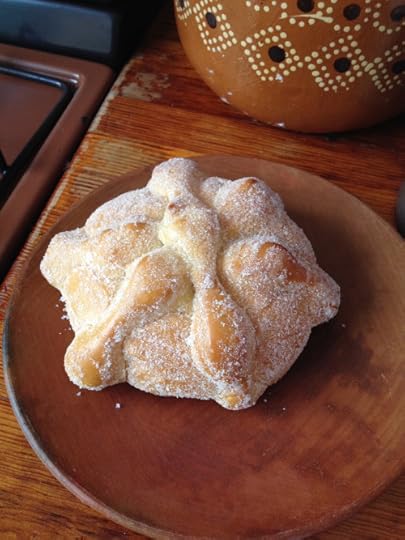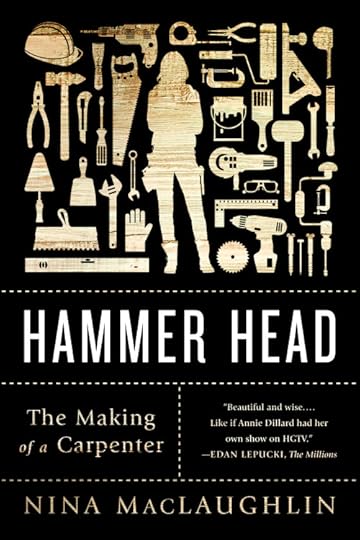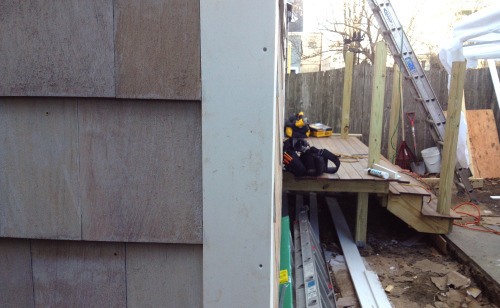Nina MacLaughlin's Blog, page 16
March 10, 2016
The bread was the size of my breast, the size of my breast
when...

The bread was the size of my breast, the size of my breast
when I am laying on my back, the size of my breast when I am laying on my back
and a little heavier and a little younger. Larger loaves were the size of
curled up cats, but the smaller ones were the size of my breast and they filled
bins and were heaped on counters in all the bakeries and cafes. The sugar
crystals that fleck that top sparkled in the light, diamond dust, and dissolved
in the wet heat of the mouth. Pan de muerto. Death bread. Bread of the dead.
The loaves appear in bakeries and cafes in the lead-up to Dia de los Muertos.
The criss-crossing swells ontop are meant to be bones, skeletal swells, phalangeal.
They grip, they grope.
It tastes something like being young. Buttery, sugary, a
whisper of citrus, and some flavor hard to place. The subtle orange exists on a
plane less crude than taste, more in the nose than on the tongue, something to
be breathed in, not swallowed. The loaf, torn
open, has a milky smell, a calcium scent that speaks to the bones, a milky
citrusness that is almost sour. Who remembers the taste of mother’s milk? All
of us breastfed? That first taste imprints itself in the passageways of our
minds, a neural pattern strengthened over six months or more of lactal meals.
The memory exists somewhere, doesn’t it? At the furthest reaches of what we
know, it’s there, far away as the moon. Chaos fills up the space between, an
obstacle course to reach it. But maybe now and then a taste, a breath, launches
us to it, and we barely recognize what we’re being reminded of. It tastes something like being young.
The texture inside is porous, an airy web of dough,
tiny-holed. It looks like the inside of a bone. Or the inside of a bone looks
like a pastry, yeasty and air pocketed, a bready tangle. Our bones make our
blood. Is it why bread is the essential food of life? Because it’s twin to our
skeleton? Fingers grip the bun, the breast, a tender, desperate clutch. Is death grip the strength of death’s fist,
most powerful, always victorious? Or is it the grip we have on life, that
essential clutch, that resistance to letting go? Our fingers continue to clutch
even after death: you’ll have to pry that
from my cold dead hands. Hold on. Hold on. Bones break. We break bread. Pan
de muerto reminds us of the bones that belong to us, what’s left of those gone,
the bones we’ll someday be.
March 9, 2016
Want a free copy of the paperback edition of Hammer Head? It’s...


Want a free copy of the paperback edition of Hammer Head? It’s light, it bends, the cover’s cool. Goodreads, hooray, is doing a giveaway right now. Toss your hat in the ring! Enter to win a free copy! There’s about nine days left! Fingers crossed you get one, and let me know if you do!
March 3, 2016
A photographer friend and his artist wife, both former
teachers...

A photographer friend and his artist wife, both former
teachers of mine, now and then send me letters in the mail. One came recently,
typed on a typewriter, always with the day of the week, the place, and the
weather in the top left corner, with a few handwritten scratch-outs, notes, and
addendums in black ink. Enclosed was a print of some old tools and hardware – “look
carefully and u will spot 2 hammer-heads,” he wrote.
It’s an obvious thing to say, about the pleasure of letters,
of the upped intimacy (your hands have touched this paper and so will mine),
the enclosedness and the opening which speaks to secrets even if what’s being
related is the simple news of living, as it was in this most recent note – news
of grandchildren, of summer guests, a death in the family, a roadtrip west to
Marfa.
These days have been marked by an unfamiliar fluttery
feeling behind my lungs, something resembling fear though not quite that.
Holding this letter, things felt suddenly, and for a moment, slower and more
human. Tools on a rock in the sun, a postscript about a banjo, and I was deposited
back to earth temporarily, and grateful for the delivery.
February 27, 2016
When I was young and had more faith in words, I was offended
by the common response to death. I’m...
When I was young and had more faith in words, I was offended
by the common response to death. I’m so
sorry for your loss.
Meaningless, I thought. Empty and useless. Better to say
nothing than to say such hollow, over-used nothing words. I’m so sorry for your loss. Like dripping sweat on a forest fire.
Like brushing dust off the surface of a desk.
I believed there had to be a better way to say it, different
words to use, and I rejected ever saying I’m
so sorry to anyone who’d lost someone they’d loved. I believed it would
actually make it worse. I thought maybe there was a way of describing the
person, or sharing a memory, or nodding at the incomprehensibility of time and
endings. I thought some collection of words – specific and rightly weighted – could
match the magnitude, the incomparable magnitude, of death. I thought it was a
matter of finding the right words to cast the right spell.
No one I’d really loved had died. I hadn’t lost anyone I
loved.
Now I know: I’m so
sorry for your loss is less about the words, and more an acknowledgement
that there aren’t any. It’s a way of saying: there aren’t words so I use these
to tell you that my heart is with your heart. It’s a way of saying: someone no
longer existing doesn’t feel like a fact, even though you know it is one. It’s
a way of saying: I recognize the pain you’re in.
(I think most people understand this earlier than I did.)
Earlier this winter, I had for the first time the experience of loss and the experience of people reacting to the losses in a way to bring comfort. Two that helped: I was at work, digging in a basement, having found out a second mother to me had died, this, not two weeks after my grandmother. I had tears on my cheeks and the dust mask hid the snot pouring out my nose. R., who M. and I work with now and then, had heard the news and knew that I was sad. He arrived in the basement and he said nothing and he came over and wrapped his arms around me. This was a good response. Another, in words, from a woman who I’m glad to be in touch with: “This must be a very sad time for you.” Yes, it was, and thank you for understanding that and, with those words, allowing for it to be. It made me wonder what people find useful, offensive, calming, comforting, angering, what words, what gestures.
For a moment I was saddened by the knowledge that words
aren’t as powerful as I’d thought them to be, that they aren’t as magic. It
also feels like an important thing to finally know, one of the most important things of all.
February 17, 2016
I.On Saturday in the early evening, I was walking to the bar
to...

I.
On Saturday in the early evening, I was walking to the bar
to meet a friend. The cold was an opponent, and my brain was filled with bees.
A couple walked in front of me, arm in arm, this in the heart of Harvard Square.
Striding down the sidewalk towards this couple and me came a big Boston bro,
tall and broad, with a massive Dunkin Donuts jug in his hand. He started being
mouthy to the couple as he approached.
“Lookit you guys. What a cute couple.” He passed them by,
they ignored him, but he kept talking at them, and looked over his shoulder
back at them as he did. “You guys look so cute to–”
And he veered, not looking ahead, and slammed into me. He
sent me spinning backwards, and my shoulderblade banged into the cold metal of
a street sign. My hat fell off.
“What the fuck?” I said. I wasn’t looking at him, I was
picking up my hat and putting it back on my head and readjusting my bag which
had slipped down my arm with the force of the collision. I figured he’d just
kept walking. He hadn’t. He’d stopped. And I looked up and saw him standing
there on the sidewalk. And when I looked at him he shouted at me.
“Don’t look at me like that you stupid cunt.”
I kept walking. And I noticed something. The cold air had
been making my eyes water. But the tears that pooled then as I moved towards the
bar a block away were so much hotter than the ones provoked by cold, as though
they came from a different place inside me, deeper and more molten.
II.
This morning, I fell. I was taking a short early morning
walk. It was so warm yesterday, a thick melty warmth, and I didn’t think of
ice. I was bombing along, coming down a hill, rounding a corner, a slick of
black ice and I went down, hard and fast. No time to flail or try to catch
myself. Upright one moment, smashed on the ground the next. A car slowed beside
me as I righted myself. A man asked if I was okay. “Yes,” I said, feeling the
blood rise to my face, not from injury but from blush – how embarassing, how
humbling it is to fall – “I’m fine. Thank you. I just slipped on some ice,” I
said, which I’m sure was obvious to him. “You sure?” he asked, leaning across
the front seat of his car. “Yes, thank you.” He drove on. I continued my walk,
feeling a sting at my knee and a throb at my elbow. And I asked my own self, am
I okay? Am I sure?
III.
I feel a little more at the mercy of gravity these days. An
op-ed in the New York Times the other day discussed why all of
us should care about the two black holes slamming into each other. The writer
observed that it’s not the type of discovery that improves our toasters, but
one that opens up our understanding of the universe, that gets at the biggest
questions: how did we get here, where did we come from? Questions which,
it occurs to me now, serve as prequels to where
will we go? He says the discovery, like art, like literature, has the
capacity to “dazzle and bewilder.” It’s a combination of states I find myself
most often in. The stars swing above us in their silent sweep. Our moon swells and shrinks. Down here, we
bash into one another, fall and rise, swing away and, by forces mysterious and
powerful, unnameable, are tugged back into orbit.
February 16, 2016
Last Wednesday, we finished a project, one we’d been on
since...


Last Wednesday, we finished a project, one we’d been on
since November. It always feels like some strange triumph. In the beginnings,
it never feels possible, as if the work will never be finished. But of course
it is. Day by day the place is improved, in the slow accumulation of efforts,
and we learn a thing or two, and feel proud of what we’ve done.
We took out the kitchen, removed the back of the house,
added columns and beams to support new weight, extended the space a little over
four feet, roofed it, closed it in, built a new kitchen, made it feel like home
again. We have a little bit of a deck to finish up, but that waits until the
ground unfreezes.
The final day involved the attendant relief and excitement
(look, look, it’s amazing, it’s done!),
and a little bit of sadness, too. It was a funny pleasure arriving at this
small home every morning, having the two young boys show us their Legos,
introduce us to their stuffed animals, to fill nail holes in crown molding and
hear them singing Beatles songs from the other room. It was just a nice place
to be. I look forward to the thaw that will bring us back there.
With the end of that job, M. and I will take a short hiatus
from the carpentry, a few weeks off. I’m starting work on a new writing project. I feel momentum
for it, focus and drive. It’s been a long time since I’ve been in just writing
mode. I am thinking about beginnings and endings. I am thinking about the way
impossible things can, over time, with effort, start to feel possible again.
February 12, 2016
The paperbacks of Hammer Head have arrived, and they’re making...

The paperbacks of Hammer Head have arrived, and they’re making me grateful for all the support and enthusiasm and word-spreading that took place for the hardcover when it came out around this time last year. To all the independent bookstores and libraries who hosted me, to everyone who bought the book, or borrowed it, or gave it to someone, to the folks who sent kind notes, to the people who came to the readings (so many lovely Tumblr friends turned out and it was such a pleasure meeting so many of you), to everyone at W.W. Norton, to the writers and editors who shed a little extra light on it, and especially to Tumblr and Rachel Fershleiser for celebrating it the way they did, thank you, thank you. And You’ll see Edan Lepucki’s endorsement right there on the cover. I’m feeling bigtime grateful for all of it, and all of you. Gratitude comin’ atcha from cold, cold Cambridge.
February 5, 2016
The scientist said there’s infinity options for what...

The scientist said there’s infinity options for what happens
after we’re dead. He didn’t say that’s it, when you’re done you’re done,
finito, nothingness. The only fact is that all of us die; after that, it’s up
for grabs. The scientist said, anyone tries to tell you what happens
afterwards? Walk away.
My mother’s family,
an atheistic bunch, has an agreement that they’ll all meet above my
grandmother’s house as ghosts, a meeting spot for them to reunite post-death.
They referenced this plan recently, with their particular gloomy strain of
sarcasm, and it struck me strange: they sold my grandmother’s house, it now
belongs to the red-haired son of a rich man who runs an oil concern, a stranger
who’s taken all of the oldness out of it. Might as well say let’s have our
afterlife rendezvous spot be the Sears in Dedham. It’s not theirs anymore,
this house. They did away with it. (The house lives in me sort of
like a ghost itself, I loved it there so much it – or its goneness – haunts me.) I
guess it’s still their plan anyway, and maybe it makes sense. Infinity’s a big
place and having a designated spot to meet seems sensible, there in the sky
above the peaked roof, over the attic where the ghosts of the house gathered,
where I slept and felt them often, the dark attic with its steep slant and wide
old wood and its long view out the window into brightness, into big and endless
brightness.
February 2, 2016
The bike messengers were a confident lot. That’s what struck
me,...

The bike messengers were a confident lot. That’s what struck
me, years ago, working on a story about the messenger scene for the Boston Phoenix (RIP). They had other
things in common – their little caps, their Carharts, their fixed gears, strong
calves, tattoos, scars and bruises, all the Style Section clichés. But each one
I talked to, male and female, possessed a certain confidence, the unmistakable
assurance of the capable. It read cocky on some, those who fancied themselves
outlaws, brazen bike pirates zooming ruleless, delivering docs to the squares.
But for the rest, there was a sense of self-reliance, of needing only a few
things to do a job (a bike, a bag, a lock, a phone, a map, and muscles), and a
simplicity of the job to be done (pick something up, take it somewhere else).
That sort of self-reliance
came to mind today as I hammered shingles to the side of the house we’re
working on in Cambridge. Tool belt at my hips, I had everything I needed: my
hammer in its loop, a pouch full of thin nails, my tape measure in its pocket
on the right, the bullet level tucked into the pouch on the front, pencil in
its own little pencil-sized holster, a pile of cedar shingles at my feet, warm
socks, a hat, a thick wool sweater. I needed nothing else. There was a similar simplicity
to the task: nail the shingles to the wall. Hours disintegrated as the shingles accumulated, row by row, up the side of the house.
There was something freeing to it – I’ve felt the same sometimes traveling,
unburdened by having only what you need on your body, unburdened by removing
yourself from everything but what’s in front of you. Even the word unburdened, doesn’t it loosen something in your
shoulders?
January 28, 2016
I didn’t expect to feel this way. We spent the afternoon nailing...

I didn’t expect to feel this way.
We spent the afternoon nailing cedar shingles to the back of
the house, onto the walls we’d built on this addition we’re reaching the final
stages of. The final outer layer. A basic task. And yet.
It felt like we were tucking the family in. It felt like we
were doing something to keep them warm and safe. It doesn’t usually feel like
this. Usually it feels like work, a task, something to scratch off the
it’s-gotta-get-done list. Not like pulling the covers over loved ones before
sleep.
Was it the act? The blanketing of walls in cedar, piece by
piece? The covering? Adding the final layer between this lovely family and the
wind and the snow and the cold? This lovely family with two young boys, chatty,
charming, smart, and their kind and patient parents with another baby on the
way, a daughter due in March. Another layer between them and the rain and
raccoons? Or is it the family itself, that we’ve more-or-less lived with now
for weeks, days and days spent in their space? A strange sort of intimacy
occurs, and suddenly I find myself feeling protective of them, protecting them.
It’s not felt this way before. The shingles bring me to my grandmother’s house,
the history there, the latch of blood, gone now, her and the house, and (I feel
so reluctant to say it outloud), a longing for just that, for the latch of
blood, enclosed, together, safe.



